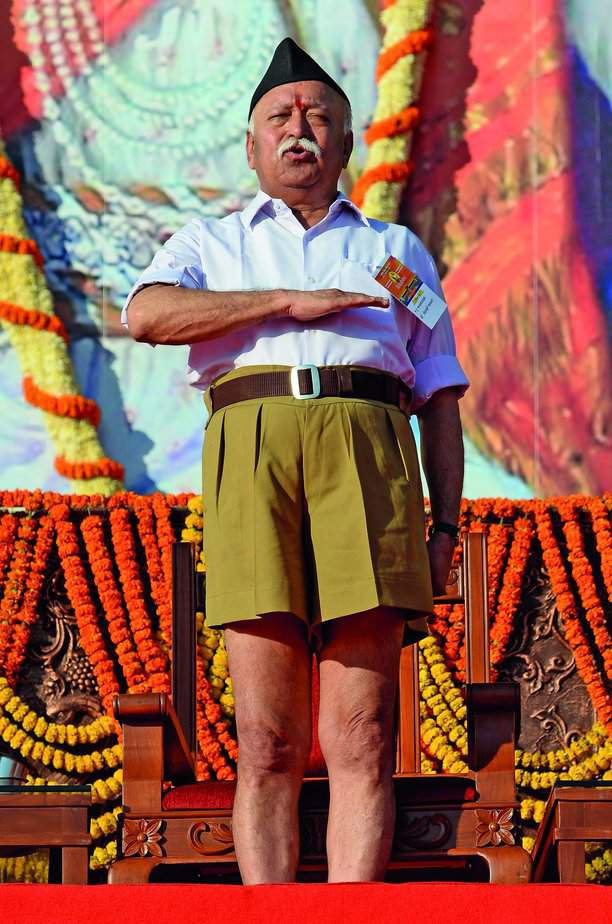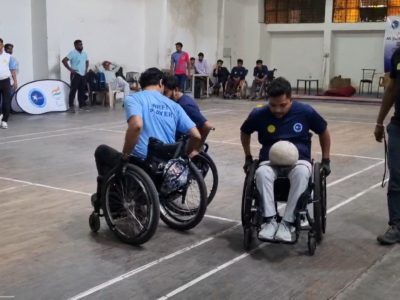RSS chief’s disapproval of Modi’s ‘Congress Mukt Bharat’ slogan may be a ploy to rob the Grand Old Party of the mantle of victimhood and protector of Dalits
Motoring smoothly towards 2019 and the aim of securing a second term for Prime Minister Narendra Modi, the Hindutva juggernaut hit a road bump shortly after tasting success in Tripura in early March. Top of the list of concerns for Modi and BJP president Amit Shah ahead of next year’s elections is the challenge posed by Dalits—an overwhelmingly poor, but electorally formidable social group.
The Supreme Court’s March 20 judgment, banning immediate arrest of a person accused of insulting or injuring a Scheduled Caste/Scheduled Tribe member, has been perceived by most Dalits as a “dilution” of the Scheduled Caste and Scheduled Tribe (Prevention of Atrocities) Act. Any dilution in the 1989 Act, they feel, leaves them more vulnerable to atrocities, threats and intimidation by upper caste men.
So, while the Prime Minister observed the birth anniversary of the Dalit icon amid much fanfare on April 14, he also suggested that Ambedkar was accorded a shabby, raw deal by the Congress.
But the top court’s order and its implication continue to haunt the Dalit imagination. The SC judgment and the violent response it triggered have forced efforts to contain the damage — the Centre filed a review petition against the order on April 2 and has been insisting that, contrary to what the Opposition says, it is not anti-Dalit at all.
Amid this tussle, the top netas of the country have ushered in a new form of protest—fasts.
Congress president Rahul Gandhi led a nationwide “fast” on April 9 to protest against the Modi government’s recent failings, including the alleged dilution of the SC/ST Act. It’s another matter that a photo of some Congress leaders eating chhole bhature before the fast led many to question the protest’s genuineness. Four days later, it was the Prime Minister’s turn to go hungry for a day, blaming the Congress for the washout of Parliament’s Budget session.
While these may just be sideshows, it’s likely that subtler moves have already been set in motion to contain the growing anger among Dalits and its potential to upset existing political equations. Rashtriya Swayamsevak Sangh (RSS) chief Mohan Bhagwat disapproving of the “Congress Mukt Bharat” slogan—a Modi coinage—may just be one such ploy. Such phrases are political slogans and not part of the Sangh’s lexicon, Bhagat said at a book launch in Pune on April 1. RSS never believed in the exclusion of anybody from the wider nationalism that it has always strived for, he added.
The comment sounded generous but many analysts believe it was an attempt to distance the RSS from the no-holds-barred battles that Modi’s BJP has waged against its rivals, particularly the Congress.
The statement was made a day before Dalit groups staged a Bharat Bandh to protest against the SC order. Given the high level of anger among the Dalits against the present establishment, the possibility of their turning towards the Congress, or at least looking in their direction, cannot be ruled out. It was, therefore, prudent of the RSS chief to ease the highly polarised political atmosphere, which has been building up since Modi’s rise at the national level.
BJP’s efforts to paint the Congress as pro-Muslim over the years have led to public resentment against them. So much so that a couple of weeks before Bhagwat’s statement, UPA chairperson Sonia Gandhi lamented at a media conclave about how the Congress was being projected as a Muslim party by saffron hotheads.
Sonia’s remark, made at a public event, could not have been missed by anybody, certainly not by the RSS. As the Dalit resentment against the BJP was becoming so palpable, Bhagwat’s remark was a half-hearted way of ridding the Congress of some of its “villainy”, so that it appears a little less appealing to the Dalits. The Scheduled Castes, after all, could very well consider taking their fight against the well-bred ruling elite, now epitomised by the BJP, by throwing their weight behind a victimised Congress.
Keeping Dalits away from the Congress has been the main agenda and strategy of both the RSS and the BJP. The Sangh Parivar has actually been concerned about the possibility of the BJP falling out with the Dalits and, thus, inadvertently pushing them to the Congress’ corner.
The BJP, therefore, maintained a studied silence when its MP from Bahraich, Savitribai Phule, expressed her resentment in Lucknow over the alleged “trampling” of Dalit rights in both UP and at the Centre. Behind the silence is the desire to see multiple Dalit leaders come up and occupy the political space so that the Dalit vote gets splintered and its impact on the BJP can be minimised.
This has been more apparent since the BJP’s humiliating defeats in the Gorakhpur and Phulpur bypolls courtesy of a political understanding between former archrivals Samajwadi Party and Bahujan Samaj Party.
Some political observers also sense a political design behind the prolonged incarceration of Bhim Army leader Chandrashekhar Azad — he’s been held in the Saharanpur Jail under the National Security Act for almost a year now. UP Chief Minister Yogi Adityanath may want him to jump into electoral fray in the future so that he splits Dalit votes in the Hindi belt.
This article has been re-published with the permission of Newslaundry. Read the original article on www.newslaundry.com





